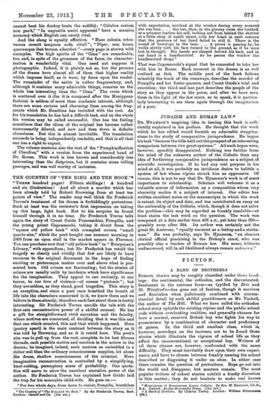JUDAISM AND ROMAN LAW.*
DR. HYAMSON'S inspiring idea in issuing this book is suffi- ciently explained in his preface. He thought that the work which be has edited would furnish an admirable stepping- stone to the study of comparative jurisprudence. He began his task "because the title held out the prospect of an interesting comparison between two great systems." All such hopes were, however, speedily disappointed. Nothing was further from the mind of the unknown author of the Collatio than any idea of furthering comparative jurisprudence as a subject of scientific investigation. If he had any real purpose in his mind at all, it was probably an invidious desire to belittle a system of law whose regime struck him as oppressive. Of course, this is not to say that Dr. Hyamson's work is of scant importance to scholarship. Scholars will welcome it as a valuable source of information on a composition whose very obscurity makes it a subject of interest. Our editor has written excellent notes on the manuscripts in which the work is extant, its object and date, and has contributed an essay on the authorship of the Collatio, which, though it does not solve the problem—this may be regarded as frankly insoluble—at least states the last word on the question. The work was composed at a date earlier than 438 A.D., yet later than 390— possibly even after 394. Its author was certainly not the great St. Ambrose, "equally eminent as a bishop and a states- man." He was probably, says Dr. Hyamsoa, "an obscure clerical official practising in the Bishop's court, who was possibly also a teacher of Roman law. His name, hitherto undiscovered, will in all likelihood always remain unknown."


















































 Previous page
Previous page